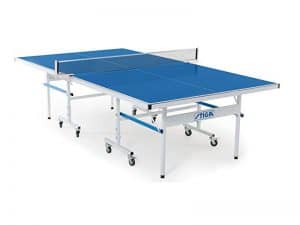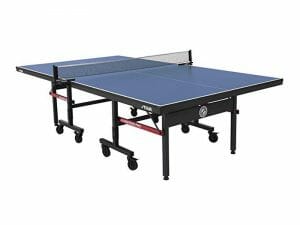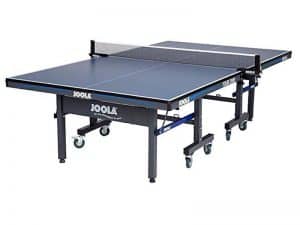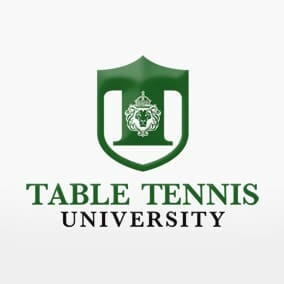Why are the Chinese so Good at Ping Pong?
- Alex Horscroft
- Last updated
What is the first thing you think of when you hear the words ‘ping pong’ or ‘table tennis’? I bet ‘China’ is pretty high up on that list. China has developed such strong ties to table tennis that even non-fans know that China rules with an iron fist.
But why is this the case? Why has China assumed the top position and remained there for decades? There is no singular answer to explain China’s dominance. Instead, China’s ping pong power is due to a multitude of factors.
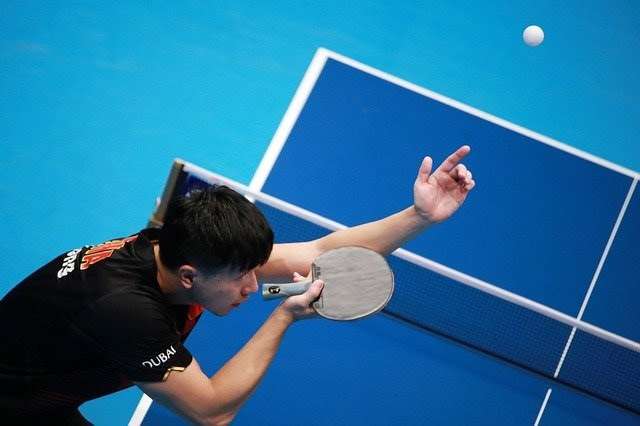
Table of Contents
China Table Tennis History – Early Adoption
What truly kick-started Chinese ping pong was the declaration of it becoming the country’s national sport in the early 1950s.
Mao Zedong selected table tennis due to its affordability and practicality. Equipment was rather cheap and could easily be replaced. It also didn’t require huge courts as with many other sports and was suitable both indoors and outdoors.
What’s more, there is little barrier of entry for table tennis. It is one of the least physically demanding sports at a beginner level. Meaning people of all ages could play with minimal risk of injury.
This meant it was an easy sport to adopt on a national scale with a relatively small upfront cost. The perfect sport for China to break out and demonstrate its muscle at the international level.
Since committing to table tennis, it has become a core part of the country’s culture. Table tennis is everywhere, almost everyone knows how to play, and the nation strongly backs the national team.
Depth of Talent in Chinese Ping Pong
One of the greatest reasons for China’s dominance is its enormous population size. At almost 1.4 billion (2021), and readily playable by most people, it is no wonder China is not short of talent.
By comparison, the US, who dominate basketball, are somewhat hindered by the restraints of the sport. To reach a competitive level, players have to be highly athletic and tall. No such restraints exist in table tennis. The population of the US also pales in comparison to China. Further highlighting why it was so easy for China to dominate table tennis once it was mass adopted.
To ensure it was played on a national scale, China essentially made the sport mandatory. Table tennis became a part of the national curriculum meaning they taught it in every school throughout China. Thereby maximizing its exposure and getting people to play table tennis from an early age.
In fact, scouting for talent in children takes place from as young as 5. Any that show promise attend specialized schools where their talent can develop. If they continue to show adequate skill, they may drop out of school in their teen years, allowing them to solely focus on developing their table tennis abilities.
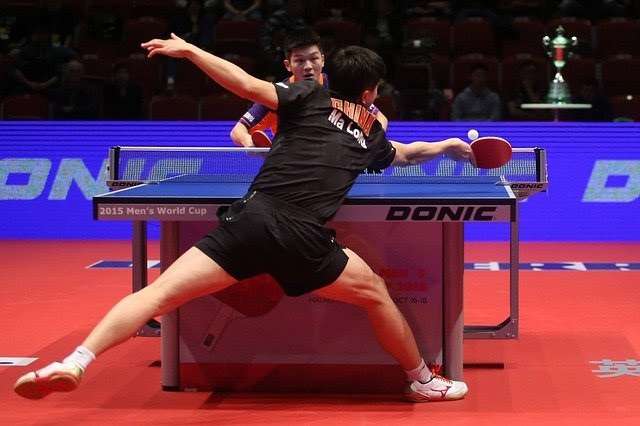
Unparalleled Training Program
Not only does China have the deepest talent pool, but they also have a cutting-edge training program. This starts with mastering the basics. Coaches will keep training simple by performing the same drills over and over again until strokes meet their standards. This is certainly a more tedious way of training, but promotes stellar form. It is almost robotic-like – as if the exact motion is pre-programmed into the player’s heads with a tiny margin for error.
Take Ma Long, for instance. Everything about his game is textbook. All of his strokes scream perfect form: he plays just like a robot.
This differs from more common training methods which encompass a variety of drills to emulate match scenarios. Whilst neither is technically better, China focuses on perfection of the basics. Standard training, on the other hand, introduces more on match IQ and creativity.
China’s coaching staff is also considered a cut above the competition. With so many elite players, many who retire or can’t reach a professional level turn to coaching as an outlet for their ping pong passion. This means exceptional coaches are widely available throughout China, giving younger players access to the guidance they need from a young age.
Attention to detail in Chinese table tennis training is another key area where they excel. As stated earlier, China has a surplus of players that can’t quite make the 1st team. So instead, these players emulate the styles of others that give China trouble. Their sole purpose is to refine their game to prepare the 1st team for specific players. These are known as blue partners.
The most famous example is Hao Shuai, a player who adapted his style to that of Timo Boll to prepare the Chinese team. At around this time, Timo Boll was the world number 1 with exceptional players such as Wang Hao, Ma Long, and Zhang Jike, breathing down his neck. The use of Hao Shuai undoubtedly helped these players prepare for when they would face Boll in competitions.
Ruthless Selection for National Team
Although China’s dominance in table tennis is well-known, it’s actually deceivingly less than what it should be.
Entry restrictions for competitions prevent any one nation from entering more than a handful of players. Take the Olympics, for example. In 2008, a new rule was introduced limiting each country to only two players for singles events. This ensures only the top-ranking Chinese players can enter, leaving very capable players who can’t quite reach the mark licking their wounds. These players are so talented, that if given the opportunity, they would have a substantial chance of winning medals.
This is sometimes proven when lower-ranking Chinese players are given opportunities to compete. They commonly perform very well. More often than not, I have never heard of these players, yet they are beating the top seeds from other nations. China is simply brimming with talent.
There is no doubt in my mind that an easing of entry restrictions would make overcoming China a near-impossible feat.
Fuelled by the knowledge that they have a surplus of capable players, China is able to be ruthless in their selection for the national team. There is no room for weak links. Just take a look at the achievements of their top performers. Training consists of 7-hour-long sessions up to 7 days per week. This coupled with a somewhat tedious style of training with lots of multiball is a very difficult regiment to follow.
It is perhaps thanks to the hard work ethic ingrained in Chinese culture that players can stick to such rigorous training. That, and the knowledge that if they falter, they will be replaced by another on the never-ending conveyor belt of Chinese table tennis players.
However, this is not to say there hasn’t been push-back in the past due to China’s strict ways. The China Open boycott in 2017 saw Fan Zhendong, Xu Xin, and Ma Long abandon their matches in protest of a coaching restructure. They did this in an effort to save their long-time coach Liu Guoliang from resignation. Each player was issued with a $20,000 fine following the incident.
Another case of strict rules for Chinese table tennis players was the ban on dating. Presumably, romantic affairs would distract them from their training. If they couldn’t commit to this harsh rule, they were out of the team.
Former world number 1 Wang Hao got into trouble for dating and it wasn’t until 25 when he was officially allowed to have a girlfriend. Years earlier, a Chinese official stated: “Dating is not against the law or regulations. But as professional players, they only have a few years to train and compete. They cannot spend it too much on dating.”
Fortunately, this situation is over a decade old now, and nothing of the sort has resurfaced, suggesting dating rules have become more lenient.
Lack of Competition
Whilst China has fully committed to table tennis, declaring it as its national sport, other countries have failed to show much love for table tennis at all compared with other sports. In fact, China is the only country where table tennis is the national sport.
The connotations of this mean there are far fewer resources, funding, and incentives to pursue it as a career. In the US, for example, it is primarily self-funded with little government support. Players must instead train according to their own schedule and fund their table tennis journey themselves.
Whilst not a direct motivation, a lack of fame for players outside of China is another drawback. Table tennis does not have the same appeal in other countries. This is simply down to differences in culture. Even during Sweden’s reign when Jan-Ove Waldner and Jörgen Persson were dominating internationally, he proclaimed that table tennis did not have much appeal to the public in Sweden.
The likes of Ma Long and Zhang Jike are considered superstars in China whereas the likes of Kanak Ha and Kai Zhang (the top-ranked USA players) are relatively unknown even in their own country.
This leads perfectly onto the overflow of Chinese players. Neither of the top-ranked USA players was actually born in the USA (India and China). When Chinese players are faced with the knowledge that they just can’t quite cut it in the national team, they instead move elsewhere.
As mentioned earlier, these players are highly talented. And as such, have no trouble securing positions in other national squads. In fact, at the last Olympics in Rio, a staggering 44 players were born of Chinese origin. Table tennis in China cannot be contained!
Conclusion
The making of table tennis a national sport is the leading reason behind China’s dominance. The country rallied behind the idea and developed a love for the game.
Table tennis has since become a core part of Chinese culture. Even with new distractions such as social media, I don’t see Chinese attitudes towards table tennis changing all that much any time soon.
What is more likely, is that China will continue to demonstrate its hard work ethic and superior training — resulting in more titles for the country. The real question is who will step up to the challenge and introduce their own blueprint for table tennis supremacy!
And last but not least: if you are looking for a job in professional tennis abroad, then go to Jooble.
Freelance writer. Table tennis enthusiast. Lover of all things online. When I’m not working on my loop game I’m probably binge-watching some fantasy show.
-
Alex Horscrofthttps://pingpongruler.com/author/alex-horscroft/
-
Alex Horscrofthttps://pingpongruler.com/author/alex-horscroft/
-
Alex Horscrofthttps://pingpongruler.com/author/alex-horscroft/
-
Alex Horscrofthttps://pingpongruler.com/author/alex-horscroft/
Popular Products
Join our email list for exclusive reviews & the latest Ping Pong News
Sign up to our newsletter and stay up-to-date with the latest news in the ping pong world, and be the first to read our new product reviews. We promise, no spam







